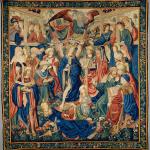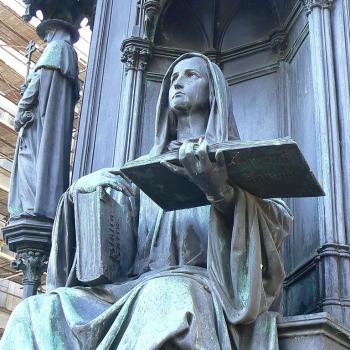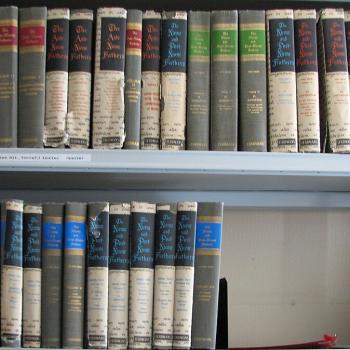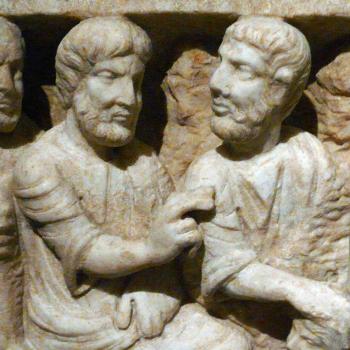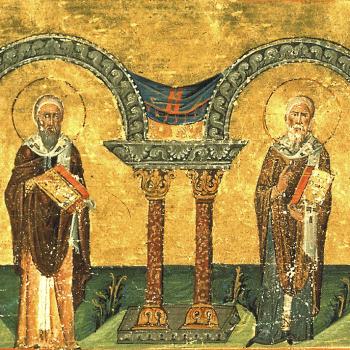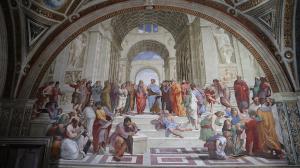
Throughout all my life, I have been drawn to theological pursuits. When I was an adolescent, and a Baptist, that meant reading Scripture, trying to understand what I read, and then taking that understanding and establishing my own systematic presentation of the faith. It was, to be sure, a rather limited and simplistic theological endeavor, and yet at the heart of it was a yearning for the truth. It is that yearning which has led me to pursue a wide range of philosophical, scientific, and theological texts, as I desire to apprehend more and more of the truth for myself, using what I apprehend to refine and develop my own theological understanding. Thus, even as a Baptist, I expanded my horizons by reading various classics of the Christian tradition, be it Protestant (C.S. Lewis, the Wesleys, and Martin Luther) or Catholic (St. Augustine, St. Thomas Aquinas, and Pascal). I quickly found myself interested in patristics, reading the Apostolic Fathers, and then, after them, other writers from the first few centuries of church history. I took what I read seriously, and wrestled with it; by doing so I found my faith was developing, becoming more sophisticated, and, with some outside influences, it eventually helped me become a Byzantine Catholic.
To this day, I have an interest in over-arching systems of faith and knowledge, but there are significant differences between the system which I construct for myself now and the type of system which I used to construct. When I was younger, I wanted to create an exhaustive, and therefore, closed system, where everything could be derived from various first principles (those given to us by revelation, science, and logic). Now, I understand I cannot create such an exhaustive system; whatever system I establish needs to be open-ended, capable of incorporating more elements of truth within it, with each apprehension of the truth leading to the overall system changing, sometimes in surprising ways. Moreover, the kind of system I wanted to establish was an entirely rationalistic one; I thought I could and would produce new theological insights the same way mathematicians developed new mathematical equations. There is, to be sure, some truth in that. We can try to discern various implications which can be derived from what we already know our believe, using reason or logic as the means by which we do so.
Faith and reason do go together, but it is important to accept the limitations of human reason, realizing that there are elements of the faith which will transcend reason, which means, they cannot be proved or established, or properly engaged, by reason alone. Similarly, I learned that there will always be an apophatic caveat behind any positive theological statement, one which recognizes the limitations inherent in any and all human conventions. The absolute truth will transcend all attempts of comprehension, which includes all attempts to describe it in theological terms. I have fully embraced what apophatic theology teaches, recognizing, however, apophatic theology does not deny us the possibility to engage theology and make positive statements about the truth; rather, it warns us not to assume too much out of such theological declarations. What is said in and through words will always be less than the absolute truth. The more we try to create a system based upon the words which we use to present theological truths, that is, the more we try to take what is stated and derive more truths from it, and ways in which those truths interconnect to establish a system, the more we will be engaging the truth on the level of conventions, with each derivative truth compounding the problems associated with the attempt to translate the truth into words. That is, the deficiencies behind any theological assertion will increase the more we try to derive more truths from the conventions themselves. This is why theology, and the systems theologians create, must not be read and studied and engaged the same way we engage mathematics. System building is always going to be a human construct, even if it is helped or inspired by the work of the Holy Spirit in the lives of those who make the systems. It can be and should be seen as an invaluable representation of the truth, but what is presented must always be understood as just that, a representation of the truth. When we study any system, any dogmatic declaration, any exploration of doctrine, we must discern the intended meaning behind such representations rather than being concerned about the words used to establish that meaning. That is, as Paul said, we should follow the spirit, not the letter, because when we look only at the letter, and become focused on the letter, we will lose touch with the truth which is not contained in the letter. And the more we get caught in the letter, and engage the letter in an extreme fashion, creating theological systems based upon a pure rationalistic engagement with the letter instead of the spirit, the systems we create will end up containing all kinds of self-contradictions which show why the system cannot be seen as anything but a pointer to a truth beyond it (this is why, when Scripture is read in this fashion, people will find all kinds of apparent self-contradictions in it).
This is where I am at in my own theological explorations: I continue to be interested in theological systems and building up my own system, one which is now expanding, and changing in and through such expansions. I build it recognizing what I am doing, that is building a conventional construct, a construct which can provide some insight to myself and to others, but also a construct which I recognize is limited and at best can point to but not comprehend the transcendent truth. There will be times, because of my development, that I will contradict myself. There will be other times where it might appear that I contradict myself, in reality, I do not, because what I say in one situation and context might appear to contradict what I say in another situation or context. Those who look to the letter, and not the spirit, of what I said, will find far more apparent contradictions in what I write than those who know they should look beyond the letter and truly discern the meaning of what I write. Those who follow the spirit of what I write will discern that my texts are intended to serve as pointers to the truth beyond them; when they do so, they will realize, instead of trying to put them together in some sort of compound synthesis, but instead use them as reference points for triangulating (as it were) the truth which is beyond what I can say or explain. To do this, context is very important, as perhaps can be seen in discussions I have concerning “self-love”: in some of them, I follow various spiritual writers who explain how “self-love” can be sinful, but in others, I point out that we must love ourselves and that it is when we hate ourselves we sin. Someone could say I contradict myself, however, if they looked at what I was saying was sinful about “self-love” they would see that is not the case; the “self-love” which is sinful is the kind which is used to have us consider ourselves better than others, so we should love ourselves more than others — that is, this kind of self-love associated with narcissism, pride, and or vainglory. This is far different from the kind of self-love which is healthy, indeed, the kind which we should have, the kind which sees everyone should be loved and shown dignity and respect, including ourselves.
There will be times when I will appear to contradict myself because dogmatic theology is riddled with paradoxes and antinomies. This, again, is because the absolute truth lies beyond our comprehension, , beyond the words we produce, and the systems which we establish based upon those words. To speak of the absolute truth will require us to engage it in a variety of ways, some which will appear to contradict other ways it is presented. Perhaps this is why dogmatic discussions of the Trinity can often have people fight each other when they are intending the same thing, such as found in many debates over the filioque. People understand their own system, their own word choice, but find it difficult to do so with other systems and the word choices used to create such other systems, especially if those other systems appear to use the same words but in ways which differ from the way they normally engage those words. If we accept this, if we accept all the qualifications which lie behind all positive theological declarations as designated by apophatic theology, we will better equipped to deal with such apparent contradictions and discern when they are real and when they are not.
Thus, when I look back at what I write and reflect on my theological journey, I can see elements which have remained with me ever since my youth; I can find elements I have gained from my studies which have led me to change my own theological system, sometimes to the point of changing my mind concerning things I once believed. Nonetheless, I find I continue following the same basic principles, the same basic methodology, in all that I do, giving me a core which connects all I have believed and written about throughout all life. I continue to be interested in developing my own theological system, and even developing my own over-arching presentation of that system, but I find to do that, it is better to engage it in parts, to explore it in parts, for it is far easier to refine my thinking in this way than to revise the system as a whole. I have already developed one over-arching representation of that system, one based upon Sophiology, and it something I hope to one day finish editing and see if anyone is interested in publishing it. But, if I do, it must, at best, be seen as an outline of the overarching system which is in my thoughts, one which is trying to point to intuitions I have which exists in a form beyond the words I use to describe it. Moreover, it is an outline written many years ago, and so at a point in time in which many things I have developed since then will not be found in it. Indeed, there are elements in it which I have already changed my mind about, but instead of removing them, I find it best to keep the work as it was intended, so that it can show us that we do not have to remain stuck in one formulation of the faith but that we can and will develop even after we write one down. I figure it is best to allow people into my own theological development instead of trying to hide it, so that others can and will be encouraged to do so as well, that is, to accept their own theological development and not be embarrassed by the changes it has taken throughout the years.
*Personal Reflections And Speculations
Stay in touch! Like A Little Bit of Nothing on Facebook.
If you liked what you read, please consider sharing it with your friends and family!
N.B.: While I read comments to moderate them, I rarely respond to them. If I don’t respond to your comment directly, don’t assume I am unthankful for it. I appreciate it. But I want readers to feel free to ask questions, and hopefully, dialogue with each other. I have shared what I wanted to say, though some responses will get a brief reply by me, or, if I find it interesting and something I can engage fully, as the foundation for another post. I have had many posts inspired or improved upon thanks to my readers.


